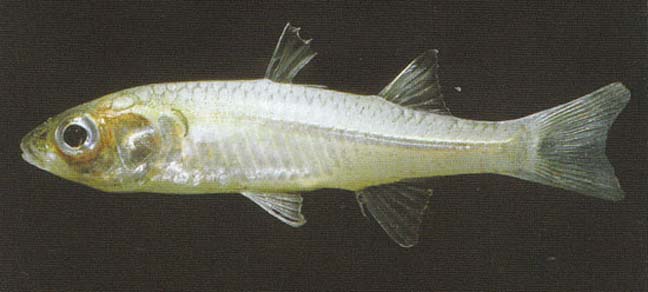Marjorie's Hardyhead, Craterocephalus marjoriae Whitley 1948

Marjorie's Hardyhead, Craterocephalus marjoriae. Source: Gerald R. Allen. License: All rights reserved
Marjorie's Hardyhead, Craterocephalus marjoriae Whitley 1948
More Info
|
Distribution |
Known only from the Mary River, QLD to the Clarence River, NSW (28º40´S). Inhabiting tropical freshwater habitats in shallow water with sand or gravel substrates. Shoal forming in clear flowing streams often around aquatic vegetation. |
|
Features |
D1 V-VII; D2 I, 6-8; A I, 6-9; P 12-16; vertebrae 32-33; GR in 1st lower arch 8-10 Body laterally compressed, moderately deep and elongate; greatest body depth 3.8-4.8 in SL; head blunt and slightly flattened, sloping towards the snout; snout acutely pointed; mouth small, not reaching eye, oblique and protrusible; teeth small, sharp, inwardly pointing in 2 rows in upper jaws and single row in dentary; upper jaw overhangs lower when mouth closed. Body scales cycloid, large, almost rectangular with prominent circuli; vertical scale rows 27-30; horizontal scale rows 5-7. No produced fin-spines; two separate dorsal fins; origin of first dorsal just behind origin of ventral fin; origin of second dorsal fin above origin of anal fin; anal fin base longer than that of second dorsal, about half its distance from caudal fin; third pectoral ray longest, reaching to above ventral base which is forward of level of first dorsal; caudal fin moderately forked. |
|
Size |
To 8.5cm SL, commonly to 5cm. |
|
Colour |
Head and belly silvery, body yellowish with a faint silver to golden mid-lateral stripe, sometimes with a dark upper edge, that becomes more pronounced in breeding males. Scale margins dusky dorsally. |
|
Feeding |
Microphagic omnivore feeding on algae, micro-crustaceans, aquatic insects, fish eggs, molluscs and terrestrial invertebrates. |
|
Biology |
Multiple spawning episodes between September and January, with peak activity at the beginning of the season; spawn in pairs depositing adhesive eggs amongst aquatic vegetation. Eggs large 1.15-1.25 mm diameter with adhesive filaments. Larvae hatch after 6-7 days at around 5.7 mm SL. |
|
Fisheries |
No existing fishery |
|
Conservation |
Not listed on the IUCN Red List of Threatened Species. lNot listed under the Australian EPBC Act. |
|
Similar Species |
Craterocephalus marjoriae is most similar to C. cuniceps but differs in scale counts and the position of the ventral fins which are positioned forward of the 1st dorsal fin in C. marjoriae compared to opposite the 1st dorsal in C. cuniceps. |
|
Etymology |
Generic name Craterocephalus comes from the Greek meaning bowl or basin and head, possibly in reference to the strong head of species in this genus. |
|
Species Citation |
Craterocephalus marjoriae Whitley, G.P. (1948). Studies in Ichthyology No. 13. Rec. Aust. Mus. 22(1): 70–94 figs 1–11 [85 fig. 7]. Eidsvold, Burnett River, QLD. |
|
Author |
Vanessa J. Thompson |
Marjorie's Hardyhead, Craterocephalus marjoriae Whitley 1948
References
Allen, G.R. (1989). Freshwater Fishes of Australia. Neptune, New Jersey : T.F.H. Publications pp. 1–240
Allen, G.R., Midgley, S.H. & Allen, M. (2002). Field guide to the freshwater fishes of Australia. Perth : Western Australian Museum 394 pp.
Crowley, L.E.L.M. & Ivantsoff, W. (1992). Redefinition of the freshwater fish genus Craterocephalus (Teleostei: Atherinidae) of Australia and New Guinea with an analysis of three species. Ichthyol. Explor. Freshw. 3(3): 273–287
Grant, E.M. (2002). Guide to Fishes. Redcliffe : E.M. Grant Pty. Limited 9th Edn 880 pp. [808].
Lintermans M. (2007) Fishes of the Murray-Darling Basin: An introductory guide. Murray-Darling Basin Commission, Canberra. 157 pp.
McDowall, R.M. (1996). Freshwater Fishes of South-eastern Australia. Sydney : Reed Books 2nd Edn 247 pp.
Milton D.A. & Arthington A. (1983) Reproduction and growth of Craterocephalus marjoriae and C. stercusmuscarum (Pisces: Atherinidae) in south-eastern Queensland, Australia. Freshwater Biology 13(6): 589-597
Pusey B., Kennard M. & Arthington A. (2004) Freshwater fishes of north-eastern Australia. CSIRO publishing, Collingwood, Victoria 684pp




